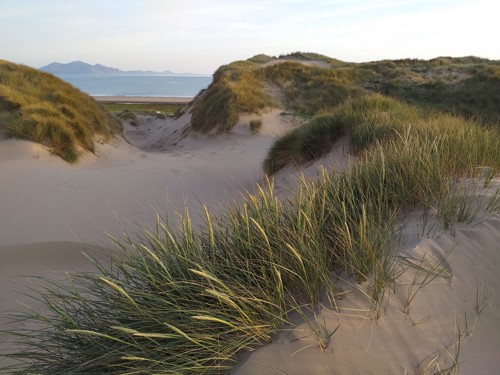Learning resources: Wales climate change emergency - There is no Planet B!
Are you looking to engage your learners in understanding...

Sand dunes are one of the most at-risk habitats in Europe. There are often rare species living on the dunes therefore it is very important that they are managed in a way to ensure these species do not become extinct. On this page, you will find activity plans covering everything from why sand dunes are important to activities explaining how to carry out sampling on sand dunes.
All the activities and games on this page will help you enable your learners to progress in the ways described in the four purposes of the Curriculum for Wales. Curriculum links are included in the documents and all the activities will help you deliver many aspects of the cross curricular Literacy and Numeracy Framework (LNF) and Digital Competence Framework (DCF).
Want to learn about sand dunes? How they form, where they can be found in Wales and what is being done to restore them? Check out our information notes.
Information note – Coastal sand dunes in Wales
Information note - Sand dunes in Wales
This activity plan highlights the importance of sustainably managing our natural resources, focusing on sand dunes and the multiple benefits they provide.
Activity plan - Why are sand dunes important?
Resource cards - Why are sand dunes important?
These activities are intended to explain the process of sand dune formation in several different ways.
Activity plan – How do sand dunes form?
Resource cards - Sand dune formation – Sets A and B
A3 diagram – Sand dune formation – for use with Set A resource card
A3 diagram – Sand dune formation – for use with Set B resource cards
Resource cards - On your marks, get set, dune!
Our ‘Activity plan - Characteristics of life and classification’ will encourage your learners to investigate the characteristics of different species that live amongst sand dunes and consider how they can be classified.
The activities and games shared in ‘Activity plan - Food webs and energy chains’ are aimed at increasing learners’ knowledge and understanding of sand dune food chains, energy transfer and relationships within a sand dune ecosystem.
Activity plan - Characteristics of life and classification
Activity plan - Food webs and energy chains
Resource cards - Both sets are used to complete several activities.
Resource cards (set A) - Sand dune super species
Resource cards (set B) - Sand dune super species
The aim of this activity is to give learners the opportunity to complete an onsite investigation into plant succession on a sand dune system and to prove or disprove a hypothesis. Suggested pre and post-visit activities are provided to maximise the learning opportunities a field visit to a dune system provides.
Activity plan - Sand dune vegetation sampling
Worksheet - Sand dune vegetation sampling
These activities enable learners to understand how marram grass root systems help to support sand dune development and how the species has adapted to the arid conditions of dune systems.
Information note - Marram grass
Activity plan - Marvellous marram
Activity plan – How do sand dunes form?
Resource cards (set A) - Sand dune super species
Resource cards (set B) - Sand dune super species
Glossary - Coastal processes and sand dunes
This activity explores people’s relationship with sand dunes and how the natural resources they provide have been used over time.
Activity plan - Sand dunes through time - Newborough Warren
Resource cards - Sand dunes through time - Newborough Warren
An introduction to the management of Pembrey Burrows.
This activity plan sees learners take on the role of social media experts. They will be asked to plan, prepare, and potentially run a social media campaign to raise awareness of the issues affecting a specific sand dune system. From highlighting how it is being managed to encouraging visitors to help preserve and respect this valuable natural resource, this activity encourages learners to put their knowledge and understanding of sand dunes to work through their setting’s social media platforms.
Activity plan – Campaigning for nature: Running a social media campaign
Worksheet – Campaigning for nature: Running a social media campaign
PowerPoint presentation - Campaigning for nature: Running a social media campaign
Learn more about the Sands of LIFE conservation project, aimed at revitalising sand dunes across Wales, by visiting the Sands of LIFE project webpage. The project will restore over 2,400 hectares of sand dunes at ten Welsh sites.